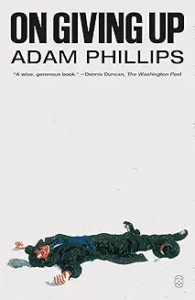On Giving Up by Adam Phillips 2024
Adam Phillips is a British psychoanalyst who has written two dozen books for the lay public with titles like “Kissing, Tickling, and Being Bored” to “Missing Out: In Praise of the Unlived Life”. At age 70 he is the general editor of the Modern Penguin Classics editions of Sigmund Freud’s work.
I found this book while browsing the London Review Bookstore. The title caught my eye, and the blurb by a great writer, John Banville, (“One of the finest prose stylists in the language.”) finished the deal. “On Giving Up” fits nicely into Phillips’ oeuvre, taking a complex set of psychoanalytic concepts and applying them in layman’s terms to an everyday issue or concern, in this case, the apparently simple but ultimately complex challenge of giving up. As he states, “We give things up when we believe we can change; we give up when we believe we can’t.”
In straightforward prose which nonetheless often confused me on the page, Phillips’ first chapter looks at the life affirming ‘giving up’ of the effort to stop smoking or drinking and the life ending decision to give up life, the philosophical and psychoanalytic challenge of suicide. He urges curiosity over certainty and suggests that the reader embrace ‘aliveness’. This book was a good fit with Podolsky’s “Determined” since it addressed some of the same issues.
On the other hand, the chapters that followed the first one about the eponymous “Giving Up” seemed to be one of this, one of that and then the kitchen sink. They were various journal and magazine articles and lectures, and it just didn’t work for me as I struggled through the ‘inside baseball’ discussions of Freud, Jung, Kafka, and others. When I am faced with a book that I just don’t think I ‘got’ as in this case, I often turn to the book’s reviews in the New York Times and the Guardian. review, and I found validation in the NYT review by Jennifer Salai who wrote: “Phillips’s looping lines of inquiry strike some of his critics as troubling, exasperating or simply annoying. Joan Acocella wrote that his “linguistic capering” often generated the kind of sentence that makes you say to yourself, “That’s interesting, I’ll think about it later,” and then you return to it and “realize that it’s not true.” The literary critic Elaine Showalter derided his “stylistic one-upmanship.” In a sharp essay for The Guardian, Oliver Eagleton argued that Phillips, with his emphasis on conversation over conviction, offers “liberal bromides” when it comes to politics instead of landing decisively on the side of “meaningful change…..One of the most arresting things about Adam Phillips’s work is how it resists easy summary, dissolving into a trace memory the moment you try to describe it.”
So it appears I am not alone in my confused reaction to this book. I’m sure there is value here, but it takes a lot of work. If you’re a therapist or an analyst, you might well enjoy the book, but for us regular folks, it’s a heavy lift.



